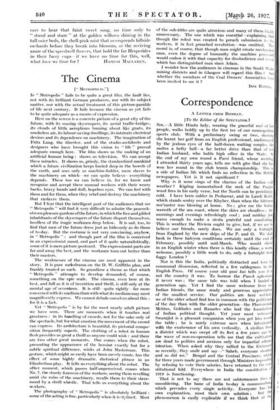The Cinema
[" Mernorot.is.1 Ir " Metropolis " fails- to be quite a great film, the fault lies, not with its brilliant German producers, nor with its subject matter, nor with the actual treatment of this picture-parable of life next century. It fails because the cinema as yet fails to be quite adequate as a means of expression.
Here on the screen is a concrete picture of a great city of the future, with its soaring skyscrapers, its aerial traffic-bridges, its clouds of little aeroplanes buzzing about like gnats, its smokeless air, its labour-saving dwellings, its intricate electrical devices and its dependence on machinery. The imagination of Fritz Lang, the director, and of the studio-architects and designers who have brought this vision to " life " proved adequate enough here. The film shows us the making of an artificial human being : shows us television. We can accept these miracles. It shows us, grimly, the standardized mankind which a future civilization keeps buried deep in the bowels of the earth, and uses only as machine-fodder, mere slaves to the machinery on which—we can quite believe--everything depends. These too we can believe in, for we know and recognize and accept these manual workers with their weary backs, heavy hands and dull, hopeless eyes. We can feel with them and for them, when they rebel and destroy the machinery that enslaves them.
But I fear that the intelligent part of the audiences that see " Metropolis " will find it very difficult to admire the peacock- strewn pleasure gardens of the future, in which the free and gilded inhabitants of the skyscrapers of the future disport themselves, heedless of the tragic workmen deep below. It is sad, too, to find that men of the future dress just as hideously as do those of to-day. But the costume is not very convincing, anyhow, in " Metropolis " : and though part of the film is conceived in an expressionist mood, and part of it quite naturalistically, some of it is mere picture-postcard. The expressionist parts arc far and away the best, and the workmen turn out better than their masters.
The weaknesses of the cinema are most apparent in the story. It is pure melodrama on the D. W. Griffiths plan, and frankly treated as such. So grandiose a theme as that which " Metropolis " attempts to develop demanded, of course, something on the epic scale. The cinema, even here at its best, and full as it is of invention and thrill, is still only at the mental age of seventeen. It is still--quite rightly--far more concerned with its medium than with what its medium may most magnificently express. We cannot delude ourselves about this : for it is a fact.
Yet – Metropolis " is by far the most nearly adult picture we have seen. There are moments when it touches real greatness : in its handling of crowds, not for the sake only of the spectacle, but for what emotion the movement of the crowd can express. Its architecture is beautiful, its pictorial compo- sition frequently superb. The clothing of a robot in human flesh provides as great a thrill as anyone could wish : and there are two other great moments. One comes when the robot, presenting the appearance of the heroine exactly but for a subtle spiritual difference, winks at John Masterman. This gesture, which might so easily have been merely comic, has the effect of some highly dramatic, rhetorical phrase in an Elizabethan play. It tells us everything about the robot. The other moment, which passes half-unperceived, conies when No. 7, the sturdy foreman of the workers, seeing them revelling amid she ruins of the machinery, recalls them to their slave- mood by a shrill whistle. That tells us everything about the workers.
The photography of " Metropolis " is absolutely brilliant : sonic of the acting is fine, particularly when it is stylized. Most
of the sub-titles are quite atrocious and many of them high's. unnecessary., The one which was essential—explaining that though the robot was created to preach submission to the workers, it in fact preached revolution—was omitted. Ile moral is, of course, that though man might create mechanical man, even the degree of humanity the machine possessed would endow it with that capacity for disobedience and re•mi; which has distinguished man since Adam.
I wonder how the audiences in cinemas in the South Watts mining districts and in Glasgow will regard this film ? And whether the members of the Coal Owners' Association hale been invited to see it ?
Jars BARRY.






















































 Previous page
Previous page